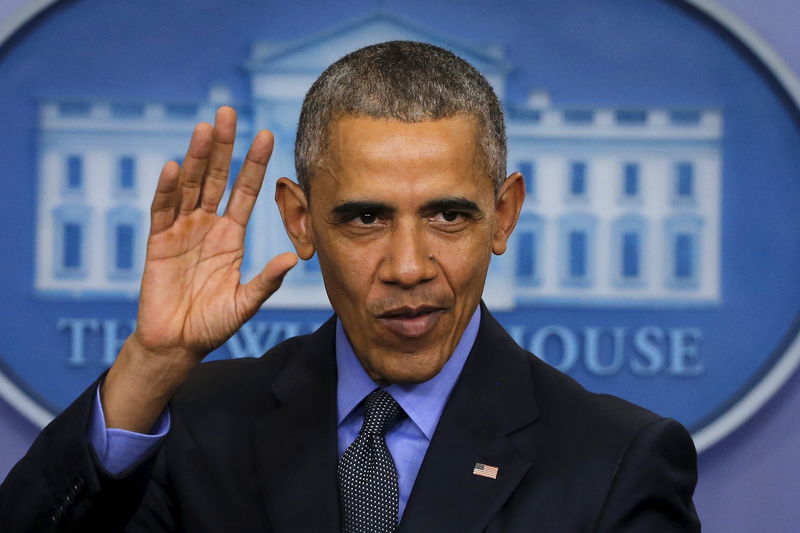By Roberta Rampton and Ayesha Rascoe
WASHINGTON (Reuters) - President Barack Obama urged Americans to remain vigilant against the potential threat of homegrown Islamic State militants on Friday, acknowledging the difficulty of tracking "lone wolf" attackers like those who went on a shooting spree in California.
Obama appeared in the White House press briefing room for a year-end news conference shortly before traveling to San Bernardino, California, where the Dec. 2 shootings took place, to meet privately with families of the victims en route to spending the holidays in Hawaii.
Obama talked tough about the prospects of defeating Islamic State militants who control broad swathes of territory in Syria and Iraq but admitted U.S. law enforcement agencies have limitations in tracking the threat at home.
"It's not that different from us trying to detect the next mass shooter. You don't always see it. They're not always communicating publicly," Obama said.
A day after telling Americans that there is no current credible militant threat in the United States, Obama said that "lone wolf plotters" are difficult to track, particularly if they are a husband and wife like the two radicalized Muslims who killed 14 people in San Bernardino.
As for U.S. efforts to track potential attackers, Obama said social media postings by potential militant suspects are constantly being reviewed by law enforcement agencies but that private online communications are far more difficult to track.
He said he believes law enforcement officials have struck the right balance between privacy concerns and making sure information gathering is carried out.
But the White House plans to work with tech companies to try to find ways to "discern more rapidly" potential threats in private communications, he said.
Concern about terrorism threats has spiked sharply since the Nov. 13 attacks by Islamic State militants in Paris, with more than 30 percent of Americans citing terrorism as the most important problem facing the United States, according to Reuters/Ipsos polling.
The fight against Islamic State militants is likely to hang over the rest of Obama's presidency, which ends in January 2017.
Obama trod carefully around the subject of how to get Syrian President Bashar al-Assad to leave power, saying Assad needed to leave for civil war to cease, but declining to say whether that would happen in the next year.
Obama has long demanded Assad resign, but no political transition has ever been agreed upon and Russia's move to defend Assad has complicated diplomatic efforts to resolve the country's civil war.
Obama has drawn fire on his approach to Syria from Republican presidential candidates who say he has left a leadership vacuum that Russian President Vladimir Putin has sought to fill.
On the U.S. campaign race to succeed him, Obama confidently predicted a Democrat will succeed him when he leaves office in January 2017.
The president's year-end session with reporters was buoyed by what he considered solid global accomplishments on climate change, trade deals, a nuclear deal with Iran, and at home, an improving economy and a just-completed budget deal with Congress.
As for next year, Obama described a "handful of areas" where progress could be made in 2016, even though the legislative process would be "skewed" by election-year politics. He cited a Pacific trade pact and criminal justice reform as examples.
Obama said his administration is working systematically to reduce the detainee population at the U.S. naval base at Guantanamo Bay, Cuba, a detention facility he has pledged to close.
Obama said he would attempt to get the Republican-led Congress to back a plan to close the facility before he considers whether to use his executive authority to address the issue. Many lawmakers strongly oppose closing the site.
"I'm not going to automatically assume that Congress says no" to a plan to close the facility, he said.
Obama sidestepped a question on whether he felt he had the power through executive action to close the Guantanamo facility and transfer detainees out of the site.
He said he will wait until Congress has said definitively no to a plan on closing the facility before he would say "anything definitive about my executive authority here."
"I'm not going to be forward-leaning on what I can do without Congress before I've tested what I can do with Congress," Obama said.
